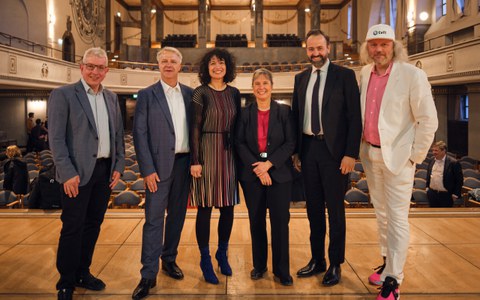Apr 09, 2025
Technological sovereignty: TUD Dresden University of Technology, LMU Munich and TUM addresses key challenges in AI

Prof. Wolfram Burgard (UTN), Prof. Holger Boche (TUM), Prof.in Stefanie Speidel (TUD), Prof.in Gitta Kutyniok (LMU), Sachsens Wissenschaftsminister Sebastian Gemkow und Prof. Frank Fitzek (TUD) bei der Eröffnungsveranstaltung.
Over the past few years, artificial intelligence has become firmly established in everyday reality. Current systems are far from perfect, however, they are energy-hungry, error-prone, and difficult to reconcile with regulations such as the EU Artificial Intelligence Act. To address these major technological challenges, researchers at LMU Munich, the Technical University of Munich (TUM), and TUD Dresden University of Technology have joined forces for an ambitious initiative: gAIn (Next Generation AI Computing) plans to create the theoretical foundations for the development of highly energy efficient and reliable new hardware and software approaches and bring them to concrete application. The Bavarian State Ministry of Science and the Arts and the Saxon State Ministry for Science, Culture, and Tourism have awarded the project funding of around six million euros for a period of three years.
Prof. Ursula Staudinger, Rector of TUD: "By participating in the gAIn project, we as an University of Excellence and together with our Cluster of Excellence CeTI are contributing our expertise in researching the interaction between hardware, information transfer and AI applications. We want to develop more resource-efficient AI systems. Together with our partners, we are making an important contribution to technological leadership in the field of AI and strengthening our cooperation with Munich's universities of excellence LMU and TUM. TUD offers an excellent environment for this: as one of nine national supercomputing centres and in close connection with the National AI Competence Centre Scalable Data Analytics and Artificial Intelligence (ScaDS.AI), we have powerful supercomputing systems as well as proven networks and resources for cutting-edge research in the field of artificial intelligence.
Sebastian Gemkow, Saxon State Minister for Science, Culture and Tourism: “gAIn is a forward-looking project with a clear vision: Germany and Europe should not only be able to keep up in the field of artificial intelligence, but also be at the forefront of global development and secure our technological independence. The project is led by experts who have a deep understanding of the challenges of AI and are also visionary thought leaders. They bring together various scientific disciplines to create an overall concept that perfectly combines AI, hardware and software. This will bring us closer to our goal of building an energy-efficient, robust and sustainable AI ecosystem in Germany that is independent of the USA and China.”
Markus Blume, Bavarian State Minister for Science and the Arts: „Three universities, two states, one goal: We want to be at the forefront of the mega topic artificial intelligence and play a decisive role in shaping the development of this key technology. The gAIn research project aligns perfectly with this ambition: it focuses on the safety and energy efficiency of AI, exploring the interaction between hardware and software. After all, AI must be safe, smart, and trustworthy. By funding gAIn, we are helping to ensure that we maintain our sovereignty in the age of AI. A big thank you to the AI experts from Saxony and Bavaria and their universities! Once again, they demonstrate: the label ‚Free State‘ stands for the future!“
Europe urgently requires technological independence
The AI technology we currently use comes almost exclusively from the United States and China. “Europe needs to wake up and pursue its own AI path without delay,” warns Professor Gitta Kutyniok, Chair for Mathematical Foundations of Artificial Intelligence at LMU and gAIn spokesperson. “If the governments of these countries were to withhold our access to current AI solutions, it would throw Europe back to the digital stone age. Technological sovereignty is potentially a matter of survival for Germany and Europe,” says Kutyniok, whose professorship is part of the Bavarian state government’s comprehensive Hightech Agenda program.
Sustainable and reliable solutions for sensitive applications
Another major challenge is resource efficiency. If AI does not become considerably more efficient, the energy consumption of the communications sector alone could exceed current global energy production in fifteen to twenty years’ time, not to mention the total energy demand of all IT applications. For this reason, the scientists from Bavaria and Saxony will be working together on alternative hardware platforms, with a focus on novel approaches like neuromorphic chips and quantum and biological computing.
The objective is that AI solutions can be adopted more quickly in sensitive areas such as medicine or in critical infrastructure such as telecommunications, the researchers from LMU, TUM, and TUD want to improve the reliability of AI. “Using new mathematical models and alternative software-hardware combinations, we can develop reliable AI and thus increase the acceptance of this technology among the general population,” summarizes Prof. Gitta Kutyniok.
